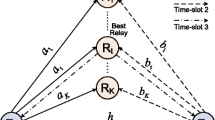Abstract
In decode-and-forward (DF) MIMO two-way relay systems, the transmission schemes are designed and the closed-form expressions for the outage probability and average symbol error rate (ASER) of the twoway relay system are derived based on two different scenarios of channel state information (CSI). For perfect CSI, the maximum-ratio-transmission and combining (MRT-MRC) technique is applied to design the beamforming and combining vectors. Without perfect CSI, the transmission scheme with limited feedback is designed, and the analytical results are verified through two kinds of codebooks, i.e., random vector quantization and Grassmann. The simulation results show that, the proposed transmission schemes for the two-way relay system can outperform other transmission schemes in the performance of outage probability and ASER, and the accuracy of the derived closed-form expressions is also verified by the numerical simulations.
Similar content being viewed by others
References
Rankov B, Wittneben A. Spectral efficient protocols for halfduplex fading relay channels. IEEE Trans Inf Theory, 2007, 25(2): 379–389
Wu Y, Chou P A, Kung S Y. Information exchange in wireless networks with network coding and physical-layer broadcast. In: Proc 39th Annual Conf Inf Sciences and Systems (CISS), Baltimore, 2005
Unger T, Klein A. On the performance of two-way relaying with multiple antenna relay stations. In: 16th IST Mobile and Wireless Communications Summit. Budapest: IEEE Press, 2007. 1–5
Zhang R, Liang Y C, Chai C C. Optimal beamforming for two-way multi-antenna relay channel with analogue network coding. http://arxiv.org/abs/0808.0075, 2008
Vaze R, Heath R W. Capacity Scaling for MIMO two-way relaying. http://arxiv.org/abs/0810.3900, 2008
Alamouti S M. A simple transmit diversity technique for wireless communications. IEEE J Select Areas Commun, 1998, 16(8): 1451–1458
Khoshnevis B, Yu W, Adve R. Grassmannian beamforming for MIMO amplify-and-forward relaying. IEEE J Select Areas Commun, 2008, 26(8): 1397–1407
Chalise B K, Vandendorpe L. Outage probability analysis of a MIMO relay channel with orthogonal space-time block codes. IEEE Commun Lett, 2008, 12(4): 280–282
Yi Z, Kim I M. Finite-SNR diversity-multiplexing tradeoff and optimum power allocation in bidirectional cooperative networks. http://arxiv.org/abs/0810.2746, 2008
Costa D B, Aissa S. Dual-hop decode-and-forward relaying systems with relay selection and maximal-ratio schemes. Electron Lett, 2009, 45(9): 460–461
Zhou S, Wang Z, Giannakis G. Quantifying the power loss when transmit beamforming relies on finite rate feedback. IEEE Trans Wirel Commun, 2005, 4(4): 1948–1957
Santipach W, Honig M. Asymptotic capacity of beamforming with limited feedback. In: Proc IEEE Int Symp Inf Theor (ISIT). Evanston: IEEE Press, 2004. 290
Love D J, Heath R W, Strohmer T. Grassmannian beamforming for multiple-input multiple-output wireless systems. IEEE Trans Inf Theory, 2003, 49(10): 2735–2747
Hammerstrom I, Kuhn M, Esli C, et al. MIMO two-way relaying with transmit CSI at the relay. In: Signal Process Advances in Wireless Commun (SPAWC). Helsinki: IEEE Press, 2007. 1–5
Dighe P A, Mallik R K, Jamuar S S. Analysis of transmitreceive diversity in Rayleigh fading. IEEE Trans Commun, 2003, 51(4): 694–703
Yoo T, Jindal N, Goldsmith A. Multi-antenna downlink channels with limited feedback and user selection. IEEE J Select Areas Commun, 2007, 25(7): 1478–1491
Laneman J N, Tse D N C, Wornell GW. Cooperative diversity in wireless networks: Efficient protocols and outage behavior. IEEE Trans Inf Theory, 2004, 50(12): 3062–3080
Tse D, Viswanath P. Fundamentals of Wireless Communication. New York: Cambridge University Press, 2005
Gradshteyn I S, Ryzhik I M. Table of Integrals, Series and Products. 7th ed. California: Academic Press, 2007
Simon M K, Alouini M S. Digital Communications over Fading Channels: A Unified Approach to Performance Analysis. New York: John Wiley and Sons, 2000
McKay M R, Grant A J, Collings I B. Performance analysis of MIMO-MRC in double-correlated Rayleigh environments. IEEE Trans Commun, 2007, 55(3): 497–507
Author information
Authors and Affiliations
Corresponding author
Additional information
Supported by the National Basic Research Program of China (Grant No. 2007CB310603), the National Natural Science Foundation of China (Grant Nos. 60672093, 60496310, 60702029, 60902012), the National High-Tech Research & Development Program of China (Grant No. 2007AA01Z262), and the Natural Science Foundation of Jiangsu Province (Grant No. BK2005061)
Rights and permissions
About this article
Cite this article
Zhao, R., Yang, L. & Zhu, W. Transmission scheme and performance analysis for decode-and-forward MIMO two-way relay systems. Sci. China Ser. F-Inf. Sci. 52, 2308–2316 (2009). https://doi.org/10.1007/s11432-009-0210-x
Received:
Accepted:
Published:
Issue Date:
DOI: https://doi.org/10.1007/s11432-009-0210-x




